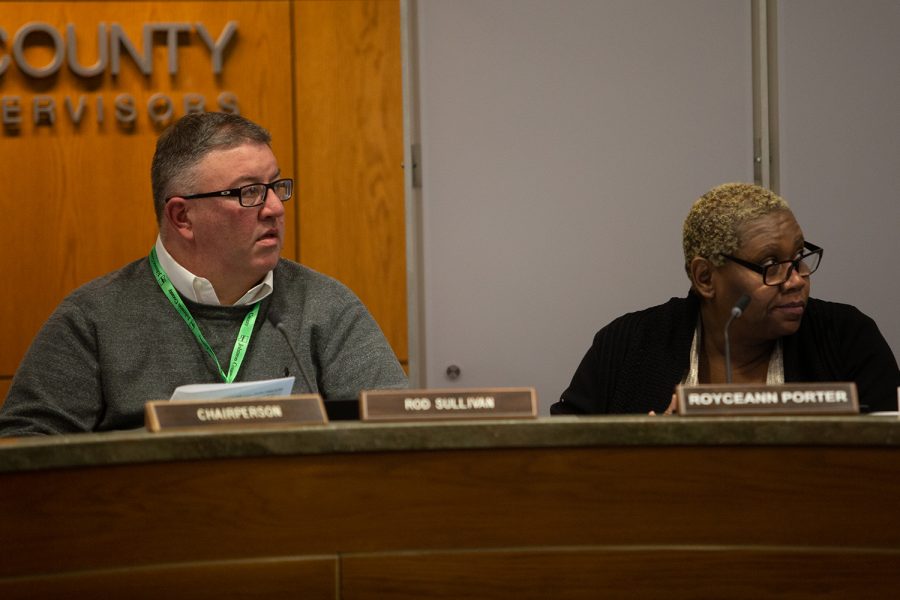Johnson County Board of Supervisors asks Iowa Gov. Kim Reynolds for a shelter-in-place order
The Johnson County Board of Supervisors discussed the lack of a shelter-in-place order for the state during an open section at its Thursday formal meeting.
Johnson County Supervisors Rod Sullivan and Royceeann Porter listen to a presentation during a meeting on Thursday, Feb. 12, 2020.
March 26, 2020
The Johnson County Board of Supervisors approved 4-1 a decision Thursday to draft a letter to Iowa Gov. Kim Reynolds, asking her to issue a shelter-in-place order for the state and to give Johnson County officials the authority to issue an order of their own if the need arises.
Johnson County Attorney Janet Lyness said that currently the county doesn’t have the authority to issue a shelter-in-place order as the state prevents them from doing so at this point in time. Even if county officials did have authority, she said, it wouldn’t encompass the entire county.
“The county taking action would only apply to the unincorporated areas as the cities have different authority,” Lyness said. “There is an argument that the cities have the authority to issue, through their mayors, an emergency proclamation to do something, but there is not a comparable condition in the Iowa Code to give the counties the authority to do that.”
Reynolds and the state have the ability to issue the shelter-in-place order for the entire state or per county, Lyness said. Reynolds can also sub-delegate her authority to local governments and entities to make the determination for themselves, she said.
Lyness recommended that the board acquire scientific backing from the Johnson County Board of Health, Iowa Department of Public Health, and local medical establishments in order to avoid making the letter appear to be a political statement.
RELATED: Iowa hasn’t issued a shelter-in-place order. What is it?
The motion to authorize Supervisor Chair Rod Sullivan to sign the letter on behalf of the board was moved by Supervisor Pat Heiden and seconded by Supervisor Royceann Porter.
“[The] anticipation [of] waiting for something to happen — that kind of scares me. I’m waiting to see what happens in the next two weeks and I’m [also] frustrated because I’ve talked to several people [with] concerns,” Porter said. “There was somebody from the university hospital that asked, ‘Can we please do like Illinois and the other states to put a shelter-in-place?’ So, therefore, there was some concern.”
Supervisor Janelle Rettig was the sole supervisor to voice opposition to the 4-1 decision.
“Our inability to run out the clock on this virus I think is important to keep in mind,” Rettig said. “Until we get a vaccination, we are going to have to live with this virus. So the timing — if we shelter-in-place for two weeks, we will have accomplished nothing per se because we are going to see a spike at the end of this.”
At the state level, Iowa Department of Public Health Deputy Director Sarah Reisetter laid out several criteria on Tuesday that the state was evaluating including rate of hospitalization and rate of infection. However, when pressed on what the specifics were on the rate of hospitalization, she didn’t give specific numbers.
At the meeting on Thursday, Johnson County Public Health Director Dave Koch said that thresholds often took weeks to figure, and that at the county level, he didn’t think that they would be able to come up with any solid values in each metric to indicate to elected officials that it’s time to issue a shelter-in-place order.
“We would have to get much much much worse on all of these metrics before we would ever get to the point where the state is, on this guidance, before we would get to a shelter-in-place…. The question was posed to the state how these values were determined. We haven’t gotten an answer back yet. I think they’re arbitrary and I think it’s difficult also for them to assign values to this.”
But University of Iowa Vice President for Medical Affairs Brooks Jackson, the dean of the Carver College of Medicine, on Wednesday said there wasn’t a need to call a halt to all nonessential travel because of Johnson County and Iowa’s demographics. He said doing so would put a stranglehold on a supply chain of tests, groceries, and personal protective equipment that is already strained as well as create unnecessary alarm.
Jackson said further restrictions would be disruptive to the economy, impair the hospitals’ supply chain, and disproportionately affect underrepresented communities and low-wage workers.
“We’re a very large organization with I think a 17,000-person headcount and probably a couple thousand are close to working from home, but we need people at the hospital and these clinics and hospitals, and they come from all over. They don’t come just from Johnson County, they come from other counties as well, traveling 24/7 there,” Jackson said. “We also depend on thousands of other people that are not UIHC employees, but provide services. These are small businesses, for example, that potentially provide services.”






